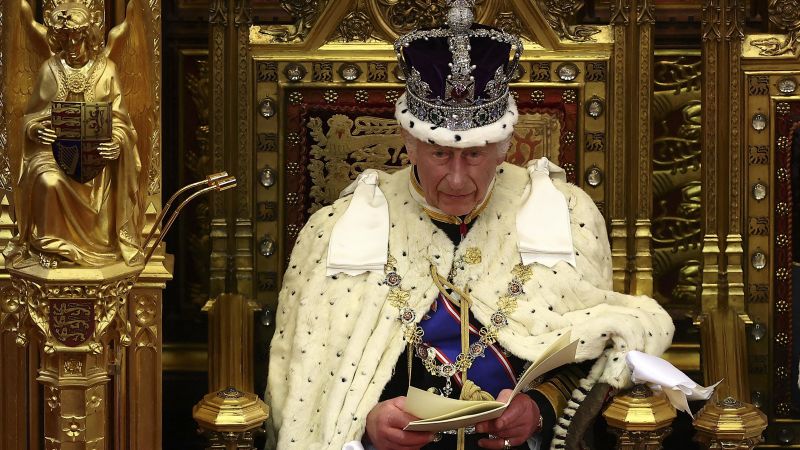CNN
—
Britain’s new Labour government promised to end the “era of politics as performance” in a King Speech on Wednesday, unveiling a comprehensive policy plan to target housing construction, crime and illegal immigration and tackle the breakdown in trust laid bare in Parliament. National general election.
In a spectacular ceremony bringing together Britain’s royal pageantry and political class, King Charles III formally opened the new Parliament, reading out the plans of new Prime Minister Keir Starmer, whose landslide victory in earlier this month’s general election brought an end to 14 years of Conservative rule.
They focused on Starmer’s central platform of “national renewal”, which included pledges to nationalise Britain’s railways and tackle the housing crisis by reforming town planning laws to build more affordable homes.
Starmer also made tough new pledges to tackle illegal immigration and delivered a broader criticism of the Conservative governments that have ruled the UK since 2010 and the rise of populism in the UK and Europe.
“The era of politics that puts performance and self-interest over service is over,” Starmer declared, introducing an agenda that includes 40 new bills that the government aims to pass. “The battle for trust is the battle that will define our political era.”
His policies straddle the middle ground in British politics that Starmer has sought to represent, appealing to the public with pragmatism and measures that will appeal to both young and old. “The dubious charms of populism may sound appealing, but it will only drive us down a dead end of further division and further disappointment,” Starmer wrote.
But while the speech embodied much of the pro-growth vision Starmer laid out during the summer election campaign, questions remain about how quickly Britons can expect improvements to struggling public services.
Dan Kitwood/Pool/AFP/Getty Images
The speech sets out the policy platform of Keir Starmer, who defeated Rishi Sunak’s Conservative Party in this month’s general election.
Glamor and politics collide
The opening of Parliament is a rare occasion when pomp and politics collide, featuring a series of colourful, centuries-old rituals and customs that catch even many British lawmakers off guard.
The play begins with King Charles III and his wife Camilla travelling in a carriage from Buckingham Palace to the Houses of Parliament, where MPs are summoned by the Black Rod, an office established in the 1300s, to watch the King’s Speech in Parliament.
Starmer and his defeated rival, Conservative leader Rishi Sunak, exchanged cordial words before and after the speech but their positions dramatically reversed after Labour won a narrow but landslide victory in Parliament in the July 4 general election.
As the speech began, the focus shifted to Labour’s first legislative programme in 15 years, centred on tackling construction after a decade of stagnant growth that saw housing and infrastructure plans across the UK falter.
Starmer also formally announced plans to renationalise Britain’s rail network over the next few years and create a national renewable energy company.
Elsewhere in the speech, Labour continued its efforts to appeal to traditional Conservative voters who have lost faith in the Conservative party after a period of turbulent government.
Starmer in particular promised to crack down on illegal immigration and small boats crossing the Channel – an issue that has dogged successive Conservative governments and helped spark a surge in support for Reform UK, a populist anti-immigration coalition that won more than four million votes in the election.
Kirsty Wigglesworth/Pool/AFP/Getty Images
This speech formally opens the new session of Parliament.
In his speech, he promised to give law enforcement extra powers to investigate people smuggling, including by carrying out stop and search at the border, and to set up a new Border Force Command, as well as to clear the UK’s huge backlog of refugees.
Domestically, several institutions are targeted for modernisation, but perhaps the most troubling is the very room where Prince Charles spoke. Under the government’s plans, hereditary peers will no longer be able to sit or vote in the House of Lords, as a “first step in wider reform” of the body.
Meanwhile, a new draft race equality bill would require large businesses to report ethnicity pay and disability pay in the same way they currently report gender pay.
It also announced long-awaited legislation to ban conversion therapy for gay and transgender people – a measure first proposed by Prime Minister Theresa May in 2018 but never made public until now.
Starmer acknowledged that Britons’ belief that politics can be a force for good is crumbling, with studies showing trust in politics is at an all-time low after a long string of scandals at Westminster.
But his policies will be underpinned by deep scepticism about whether Britain’s public services can be revived without a much bigger injection of funding than the government is providing.
The speech contained little focus on the UK’s National Health Service (NHS) or social care sector, where controls will take priority over new laws.
The plan is due to be debated in the House of Commons later on Wednesday, the first formal session of the new Parliament, where Mr Sunak, in his new role as Leader of the Opposition, is likely to grill Mr Starmer on his pledges. He is expected to frame his party’s unfamiliar role as an effort to provide constructive opposition for the country while acknowledging that people were hungry for change.


